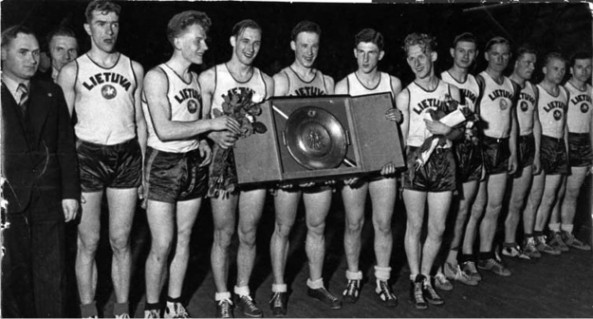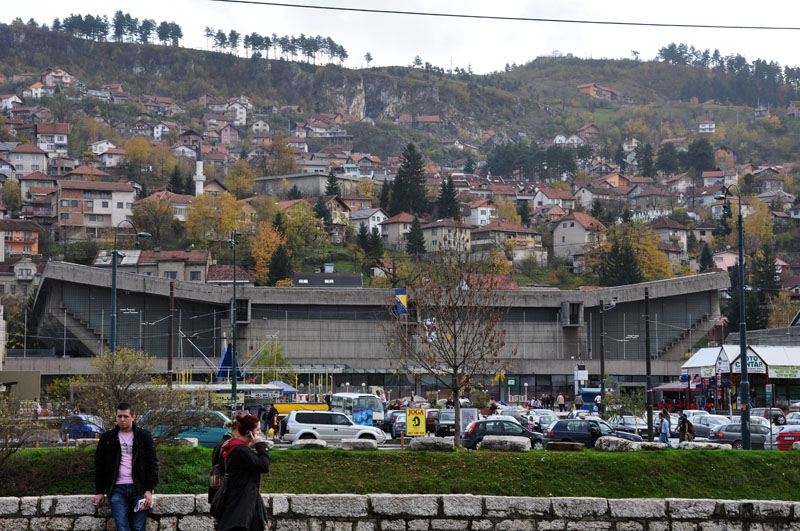|
Ranko Žeravica
Ranko Žeravica ( sr-cyr, Ранко Жеравица; 17 November 1929 – 29 October 2015) was a Serbian professional basketball coach. With a career that spanned over 50 years, he is most noted for his work with the senior Yugoslav national team, during the 1960s, 1970s, and early 1980s. In particular, Žeravica's single biggest achievement was guiding the country to its first ever major competition win — a gold medal on home soil, at the 1970 FIBA World Championship — leading to a huge expansion of the game of basketball throughout Yugoslavia. In 2007, he was enshrined into the FIBA Hall of Fame. Ranko Žeravica Sports Hall was named after him in his honor, in 2016. Early life Born to father Milorad, and mother Gordana, in the village of Dragutinovo (before it merged with Beodra into Novo Miloševo), Žeravica's education started in his village and continued in Kikinda, where he traveled every day by train. His family stemmed from Herzegovina by ancestry, having move ... [...More Info...] [...Related Items...] OR: [Wikipedia] [Google] [Baidu] |
YUBA Liga
The YUBA League was the top-tier men's professional basketball league in Serbia and Montenegro (previously FR Yugoslavia). Founded in 1992 and folded in 2006, it was run by the Basketball Federation of Serbia and Montenegro. The name ''YUBA League'' (Yugoslav Basketball Association League) was used in Serbia and Montenegro until 2005. It consisted of the first-stage "First League", and the second-stage "Super League", with each having their own men's and women's divisions. The league was also named YUBA League: ''Sportstar YUBA League'', ''Winston YUBA League'', ''Frikom YUBA League'', ''Efes Pils YUBA League'', ''Atlas Pils YUBA League'', and ''Sinalco First League'', for sponsorship reasons. For past league sponsorship names, see the list below. When Serbia and Montenegro peacefully separated in 2006, the YUBA League ceased to exist and was re-branded as the Basketball League of Serbia a Serbia-only organization, with Montenegro forming its own federation. Rules Competition ... [...More Info...] [...Related Items...] OR: [Wikipedia] [Google] [Baidu] |
Basketball Coach
Basketball coaching is the act of directing and strategizing the behavior of a basketball team or individual basketball player. Basketball coaching typically encompasses the improvement of individual and team offensive and defensive skills, as well as overall physical conditioning. Coaches also have the responsibility to improve their team by player development, strategy, and in-game management. Coaches also teach and inspire their team to be their best. Coaching is usually performed by a single person, often with the help of one or more assistants. Coaching tools A dry erase clipboard or tablet computer with a basketball court outline is often used mid-game to describe plays and provide an overview of the strategy of the opposing team. Coaches strategize and scout opposing teams and find ways to defeat them as easily as possible. At the same time, they overlook their own personal team to start the best five players (only five players can be on floor at one time). Coaches, also, ... [...More Info...] [...Related Items...] OR: [Wikipedia] [Google] [Baidu] |
EuroBasket 1969
The 1969 FIBA European Championship, commonly called FIBA EuroBasket 1969, was the sixteenth FIBA EuroBasket regional basketball championship, held by FIBA Europe. First round Group A – Caserta Group B – Naples Knockout stage Places 9 – 12 in Naples Places 5 – 8 in Naples Places 1 – 4 in Naples Finals – all games in Naples Final standings # # # # # # # # # # # # Awards Team rosters 1. Soviet Union: Sergei Belov, Alexander Belov, Modestas Paulauskas, Gennadi Volnov, Priit Tomson, Anatoly Polivoda, Zurab Sakandelidze, Vladimir Andreev, Aleksander Kulkov, Aleksander Boloshev, Sergei Kovalenko, Vitali Zastukhov (Coach: Alexander Gomelsky) 2. Yugoslavia: Krešimir Ćosić, Ivo Daneu, Nikola Plećaš, Vinko Jelovac, Damir Šolman, Rato Tvrdić, Ljubodrag Simonović, Trajko Rajković, Dragutin Čermak, Dragan Kapičić, Vladimir Cvetković, Zoran Marojević (Coach: Ranko Žeravica) 3. Czechoslovakia: Jiří Zídek Sr., Vladimir Pist ... [...More Info...] [...Related Items...] OR: [Wikipedia] [Google] [Baidu] |
EuroBasket 1971
The 1971 FIBA European Championship, commonly called FIBA EuroBasket 1971, was the seventeenth FIBA EuroBasket regional basketball championship, held by FIBA Europe. Venues First round Group A – Essen Group B – Böblingen Knockout stage Places 9 – 12 in Essen Places 5 – 8 in Essen Places 1 – 4 in Essen Finals – all games in Essen Final standings # # # # # # # # # # # # Awards Team rosters 1. Soviet Union: Sergei Belov, Alexander Belov, Modestas Paulauskas, Anatoly Polivoda, Vladimir Andreev, Priit Tomson, Ivan Edeshko, Alzhan Zharmukhamedov, Zurab Sakandelidze, Mikheil Korkia, Aleksander Boloshev, Aleksei Tammiste (Coach: Vladimir Kondrashin) 2. Yugoslavia: Krešimir Ćosić, Nikola Plećaš, Aljoša Žorga, Vinko Jelovac, Ljubodrag Simonović, Dragutin Čermak, Borut Bassin, Dragan Kapičić, Blagoja Georgievski, Žarko Knežević, Dragiša Vučinić, Davor Rukavina (Coach: Ranko Žeravica) 3. Italy: Dino Meneghin, Pier ... [...More Info...] [...Related Items...] OR: [Wikipedia] [Google] [Baidu] |
FIBA EuroBasket
EuroBasket, also commonly referred to as the European Basketball Championship, is the main international basketball competition that is contested quadrennially, by the senior men's national teams that are governed by FIBA Europe, which is the European zone within the International Basketball Federation. The competition was first held in 1935. The former Soviet Union holds the record for most gold medals with a total of 14. The tournament is generally held in August or September, in the offseason of major club competitions. The current defending champion is Spain, who won the 2022 title. History Beginning The first championships was held three years after the establishment of FIBA, in 1935. Switzerland was chosen as the host country, and ten countries joined. Only one qualifying match was played between Portugal and Spain. With a complicated formula, the final would see Latvia as champions. According to the rule at the time, the winner had to hold the following games. The follo ... [...More Info...] [...Related Items...] OR: [Wikipedia] [Google] [Baidu] |
1982 FIBA World Championship
The 1982 FIBA World Championship was the 9th FIBA World Championship, the international basketball world championship for men's teams. The tournament was hosted by Colombia from 15 to 28 August 1982. Qualification Venues Competing nations Preliminary round Group A Group B Group C Classification round Semifinal round Final round Third place playoff Final Final rankings Awards All-Tournament Team * Doc Rivers (USA) * Dragan Kićanović (Yugoslavia) * Juan Antonio San Epifanio (Spain) * Vladimir Tkachenko (USSR) * Anatoli Myshkin (USSR) Top 10 scorers (points per game) # Rolando Frazer (Panama) 24.4 # Ian Davies (Australia) 23.4 # Wilfredo Ruiz (Uruguay) 23.4 # Dié Drisa (Côte d'Ivoire) 21.6 # Dragan Kićanović (Yugoslavia) 21.1 # Oscar Schmidt (Brazil) 21.0 # Stanislav Kropilak (Czechoslovakia) 19.3 # Juan Antonio San Epifanio (Spain) 18.1 # Gustav Hraska (Czechoslovakia) 18.0 # Jay Triano ... [...More Info...] [...Related Items...] OR: [Wikipedia] [Google] [Baidu] |
1967 FIBA World Championship
The 1967 FIBA World Championship was the 5th FIBA World Championship, the international basketball world championship for men's teams. It was hosted by Montevideo, Uruguay from 27 May to 11 June 1967. Venues Competing nations Competition format * Preliminary round: Three groups of four teams play each other once; top two teams progress to the final round, bottom two teams relegated to classification round. * Classification round: All bottom two teams from preliminary round group play each other once. The team with the best record is ranked eighth; the worst is ranked 13th. * Final round: All top two teams from preliminary round group, the 1964 Olympic champion, and the host team play each other once. The team with the best record wins the championship. Preliminary round Group A Group B Group C Classification round Final round Awards Final rankings All-Tournament Team * Radivoj Korać (Yugoslavia) * Ivo Daneu ( ... [...More Info...] [...Related Items...] OR: [Wikipedia] [Google] [Baidu] |
1970 FIBA World Championship
The 1970 FIBA World Championship was the 6th FIBA World Championship, the international basketball world championship for men's teams. It was hosted by Yugoslavia in Sarajevo, Split, Karlovac, Skopje and Ljubljana, from 10 to 24 May 1970. It was the first ever FIBA World Championship hosted outside South America. Competing nations Venues Preliminary round Group A Group B Group C Classification round Final round Final rankings All-Tournament Team * Krešimir Ćosić (Yugoslavia) * Sergei Belov - (MVP) (Soviet Union) * Modestas Paulauskas (Soviet Union) * Ubiratan Pereira Maciel (Brazil) * Kenny Washington (U.S.) Top scorers (ppg) # Shin Dong-Pa (South Korea) 32.6 # Davis Peralta (Panama) 20 # Jiri Zidek Sr. (Czechoslovakia) 19.3 # Pedro Chappe Garcia (Cuba) 18.5 # Pedro Rivas (Panama) 18.5 # Lee In-Pyo (South Korea) 18 # Omar Arrestia (Uruguay) 17.7 # Luiz Cláudio Menon (Brazil) 17.3 # Bob Molinsk ... [...More Info...] [...Related Items...] OR: [Wikipedia] [Google] [Baidu] |
FIBA World Cup
The FIBA Basketball World Cup, also known as the FIBA World Cup of Basketball or simply the FIBA World Cup, between 1950 and 2010 known as the FIBA World Championship, is an international basketball competition contested by the senior men's national teams of the members of the International Basketball Federation (FIBA), the sport's global governing body. It is considered the flagship event of FIBA. The tournament structure is similar, but not identical, to that of the FIFA World Cup; both of these international competitions were played in the same year from 1970 through 2014. A parallel event for women's teams, now known as the FIBA Women's Basketball World Cup, is also held quadrennially. From 1986 through 2014, the men's and women's championships were held in the same year, though in different countries. The current format of the tournament involves 32 teams competing for the title at venues within the host nation. The winning team receives the Naismith Trophy, first awarded i ... [...More Info...] [...Related Items...] OR: [Wikipedia] [Google] [Baidu] |
Basketball At The 1968 Summer Olympics
Basketball contests at the 1968 Summer Olympics was the seventh appearance of the sport of basketball as an official Olympic medal event. It took place at the Palacio de los Deportes in Mexico City, Mexico from October 13 to October 25, 1968. The United States defeated Yugoslavia to win their seventh straight gold medal in this sport, while the Soviet Union earned the bronze against Brazil. Medal summary Qualification Automatic qualifications were granted to the host country and the first five places at the previous tournament. Additional spots were decided by various continental tournaments held by FIBA plus two additional tournaments that granted two extra berths each. Format * Two groups of eight teams are formed, where the top two from each group compete for the medals in a knockout round. * The remaining places are defined as follows: **Fifth through eighth places are decided in a separate bracket between the third and fourth places from each group in a separate bracke ... [...More Info...] [...Related Items...] OR: [Wikipedia] [Google] [Baidu] |
Basketball At The 1980 Summer Olympics
Basketball at the 1980 Summer Olympics was the tenth appearance of the sport of basketball as an official Olympic medal event. It was held from July 20 to July 30 at the Olympiiski Indoor Stadium Olympic Games Official Report 1980 Moscow-Volume III /ref> and at the CSKA Sports Palace, both located in , |


